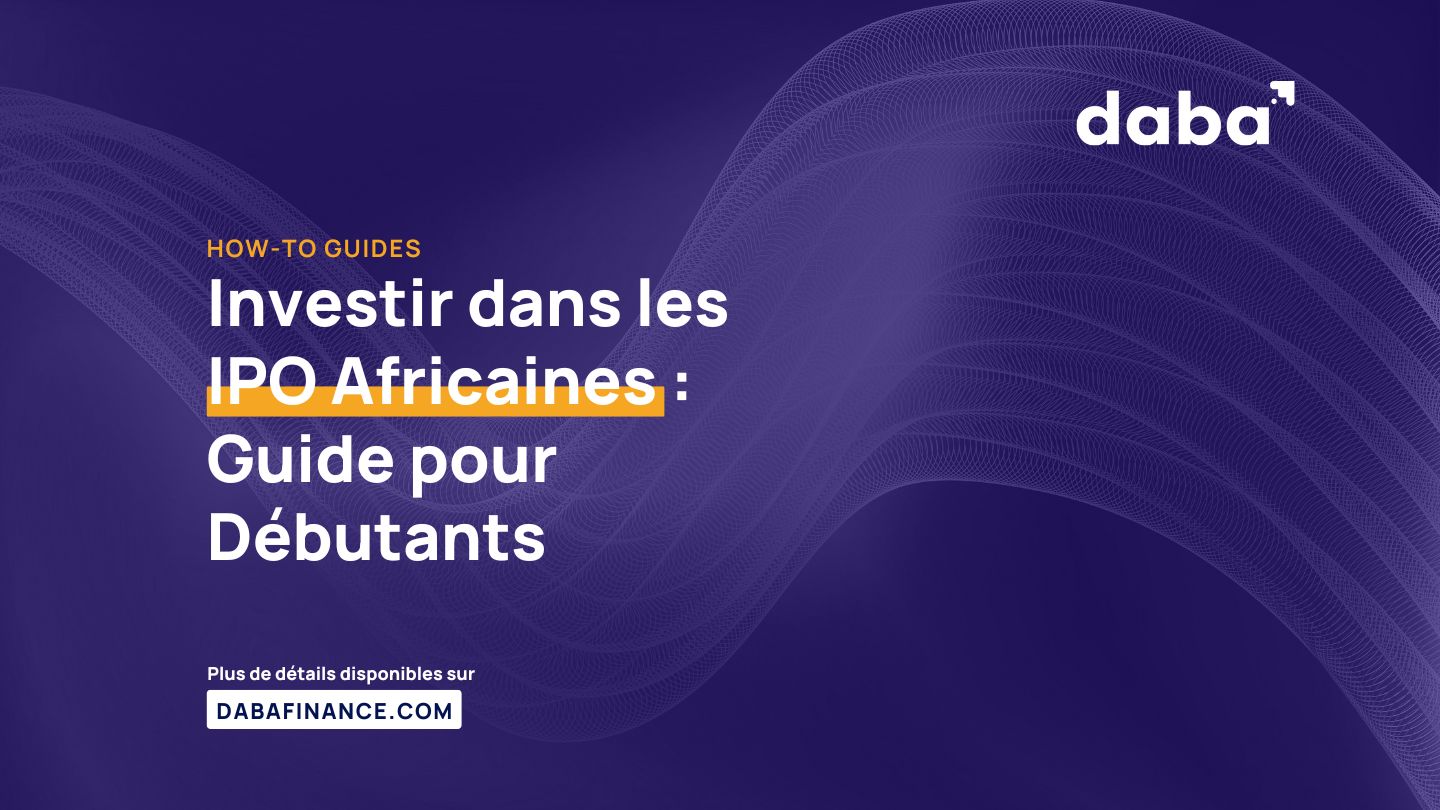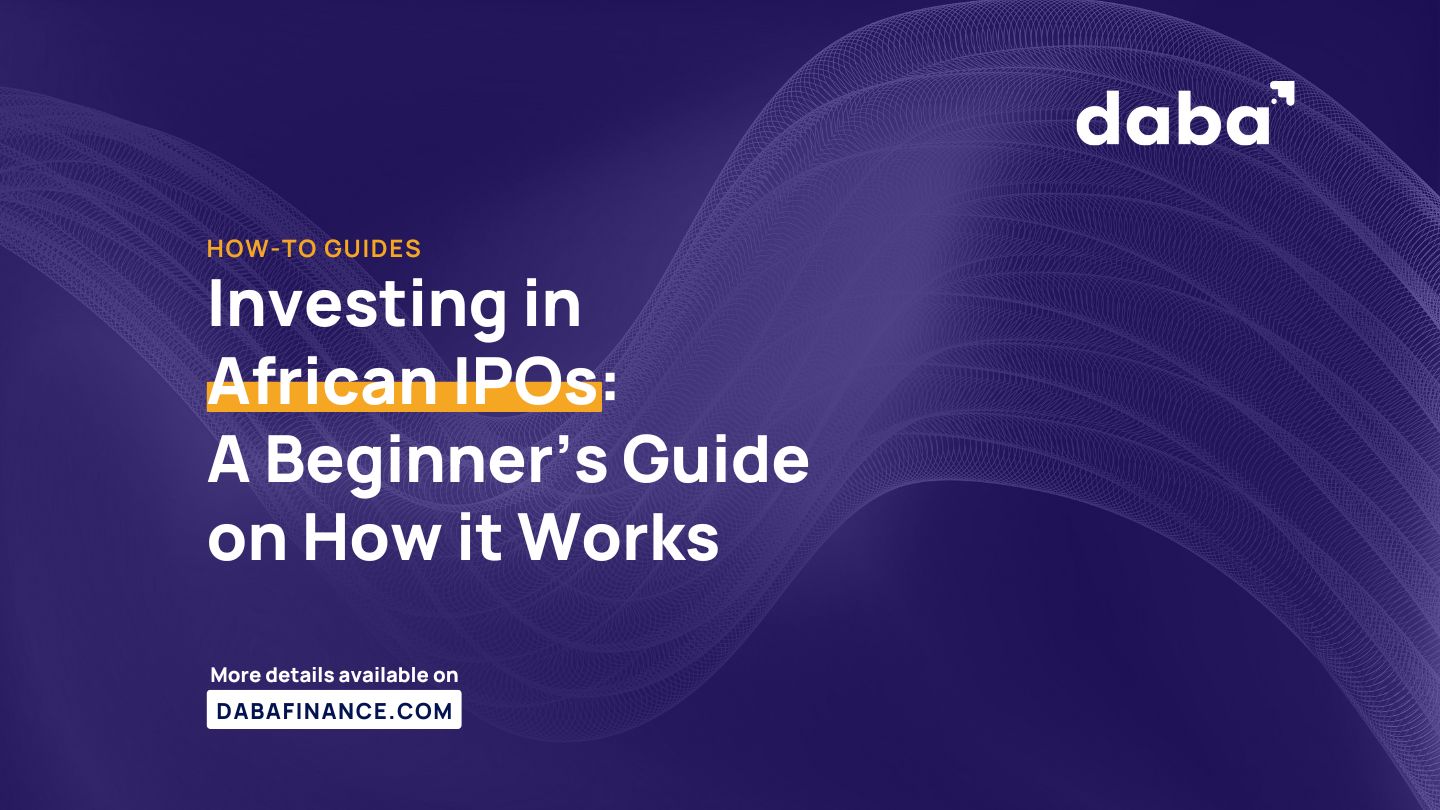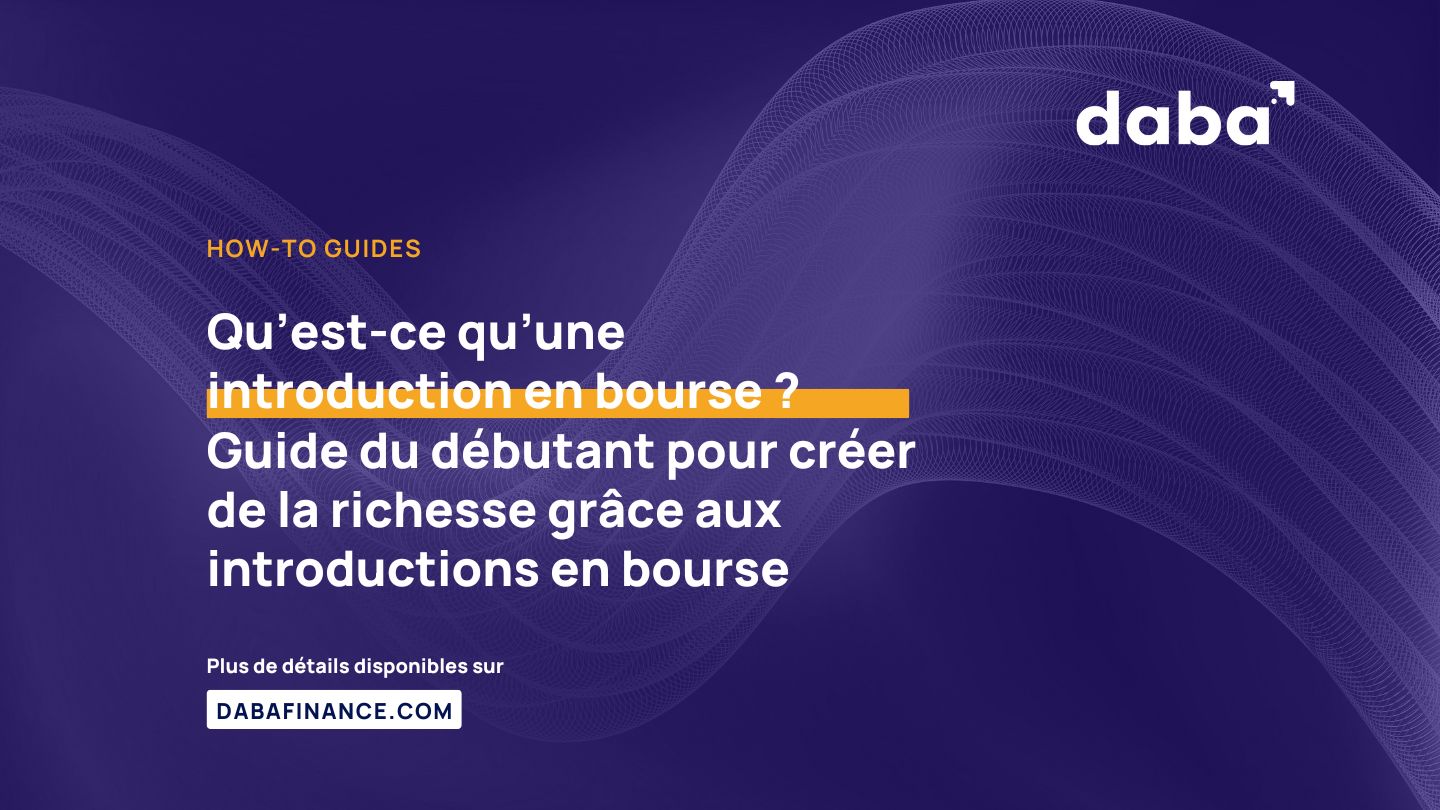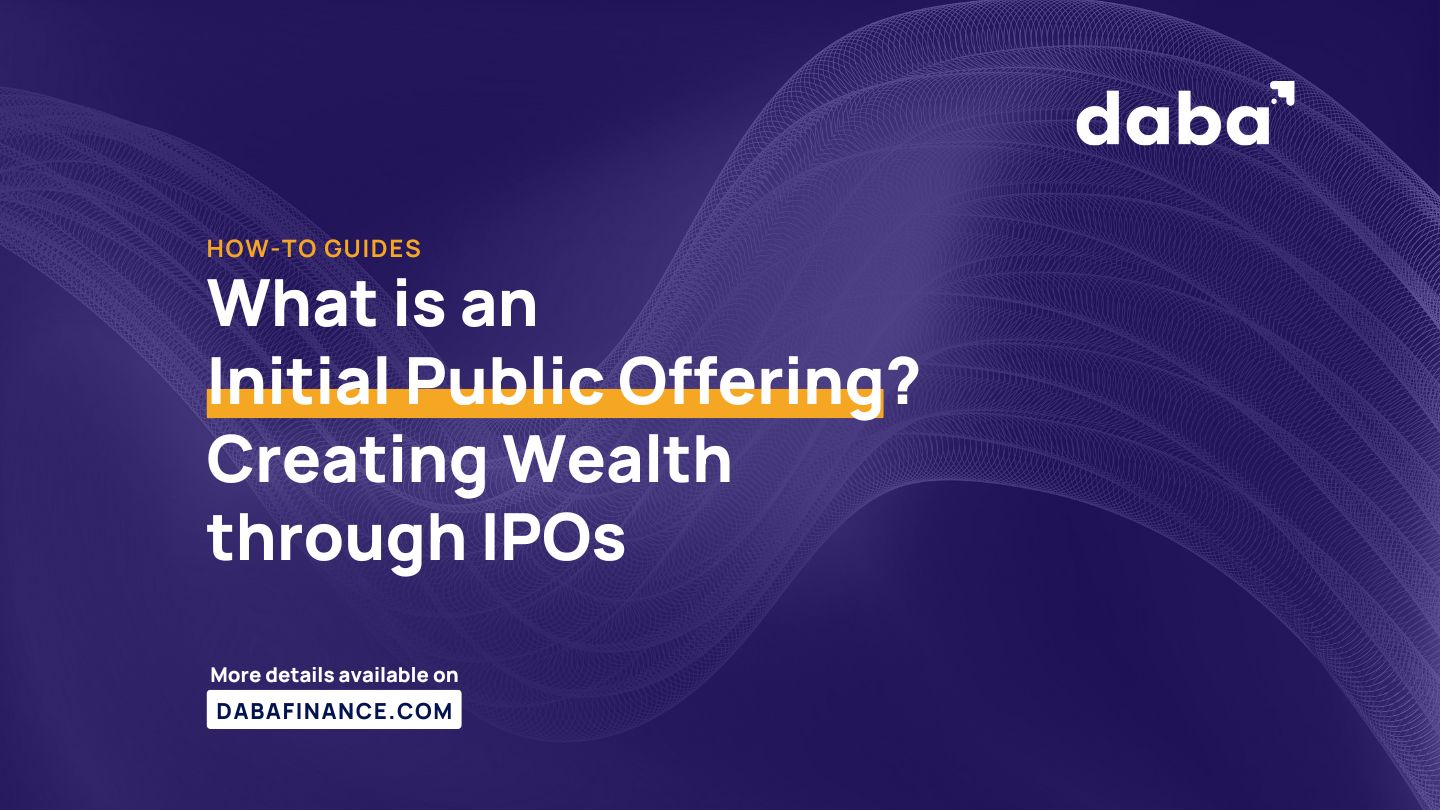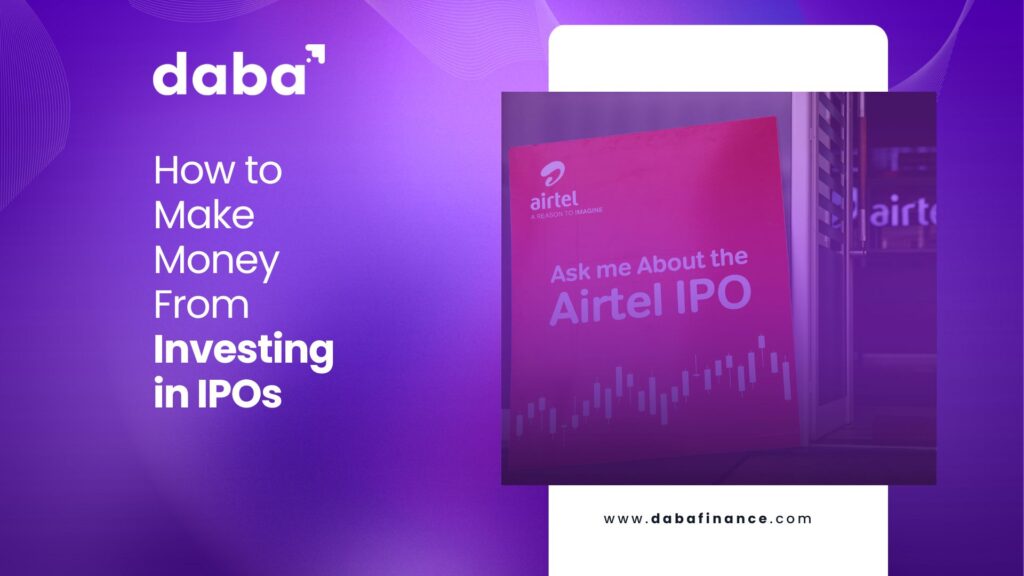Les IPO sont un excellent moyen d’investir tôt dans des entreprises prometteuses. En tant qu’utilisateur de Daba, vous pouvez facilement accéder à ces opportunités et les analyser à travers l’Afrique.
Investir dans une introduction en bourse (IPO) peut être l’une des opportunités les plus intéressantes du marché financier. C’est le moment où une entreprise privée devient publique en mettant pour la première fois ses actions en vente sur une bourse. Si vous avez déjà voulu investir dans une entreprise dès ses débuts et potentiellement profiter de sa croissance future, il est essentiel de comprendre le fonctionnement des IPO.
Dans ce guide, nous expliquons étape par étape le processus des IPO pour vous aider à investir en toute simplicité, notamment via Daba, qui permet d’accéder aux IPO sur les marchés boursiers africains comme la BRVM.
Qu’est-ce qu’une IPO ?
Une IPO (Initial Public Offering) est le moment où une entreprise privée vend ses actions au public pour la première fois. Cela permet à l’entreprise de lever des capitaux pour financer son expansion tout en donnant aux investisseurs l’opportunité de devenir actionnaires.
Une fois l’IPO réalisée, l’entreprise devient cotée en bourse, et ses actions peuvent être achetées et vendues comme toute autre action.
Exemples d’IPO Africaines Marquantes et de Leurs Performances
- Orange Côte d’Ivoire (Décembre 2022)
- Orange Côte d’Ivoire, un leader des télécommunications en Côte d’Ivoire, a finalisé son IPO le 30 décembre 2022, levant environ 141 milliards de FCFA (228 millions $).
- L’action a été cotée sur la Bourse Régionale des Valeurs Mobilières (BRVM).
- Depuis son introduction, le titre a affiché une hausse de plus de 70 %.
- Boxer (Novembre 2024)
- Boxer, une chaîne sud-africaine de supermarchés discount et filiale de Pick n Pay, est entrée en bourse le 28 novembre 2024 sur la Bourse de Johannesburg (JSE).
- L’IPO a permis de vendre 34,4 % du capital, levant 8,5 milliards de rands (471 millions $).
- Dès son premier jour de cotation, l’action a progressé de 16 %, témoignant d’une forte confiance des investisseurs.
- Talabat (Décembre 2024)
- Talabat, une entreprise de livraison de repas basée au Moyen-Orient et filiale de Delivery Hero (Allemagne), a réalisé une IPO en décembre 2024, levant 2 milliards de dollars.
- L’action a été introduite au prix de 1,60 AED, représentant une valorisation de 37,3 milliards AED (10,1 milliards $).
- L’IPO a été largement sursouscrite, signe d’un fort intérêt des investisseurs.
Ces IPO illustrent l’intérêt croissant des investisseurs pour les marchés africains et moyen-orientaux.
Comment Fonctionne une IPO ? (Étape par Étape)
Étape 1 : L’Entreprise Prépare son IPO
Avant qu’une entreprise puisse être cotée en bourse, elle doit remplir plusieurs exigences réglementaires et financières, notamment :
- Engager des banques d’investissement pour gérer le processus d’IPO.
- Déposer des documents auprès de la bourse et des régulateurs financiers.
- Déterminer la valorisation de l’entreprise (combien elle vaut).
- Fixer une fourchette de prix pour l’IPO en fonction de la demande.
Par exemple, si une grande entreprise de télécommunications en Côte d’Ivoire souhaite entrer en bourse sur la BRVM, elle doit suivre un processus strict de divulgation financière et obtenir les approbations nécessaires avant de proposer ses actions aux investisseurs.
Étape 2 : La Période de Souscription à l’IPO
Avant le lancement officiel, l’entreprise ouvre une période de souscription permettant aux investisseurs d’acheter des actions au prix fixé.
En tant qu’utilisateur de Daba, vous pouvez accéder aux IPO directement sur la plateforme et voir :
- Les informations sur l’entreprise et les raisons de son entrée en bourse.
- Le prix d’introduction et le nombre d’actions disponibles.
- La date limite de souscription (période pour postuler aux actions).
Vous pouvez postuler à l’achat d’actions via votre compte Daba avant la clôture de l’IPO.
Étape 3 : Lancement de l’IPO et Début de la Cotation
Une fois la souscription terminée, les actions sont cotées en bourse et les échanges commencent.
- Si la demande pour l’action est forte, le prix peut augmenter immédiatement après la cotation, permettant aux investisseurs de réaliser des gains rapides.
- Toutefois, les prix des actions peuvent fluctuer, influencés par les conditions du marché.
Étape 4 : Que Se Passe-t-il Après l’IPO ?
Une fois l’action cotée, vous avez deux choix en tant qu’investisseur :
- Conserver vos actions et attendre la croissance à long terme.
- Vendre vos actions si le prix augmente rapidement et réaliser une plus-value.
Sur Daba, vous pouvez suivre la performance des actions, consulter des analyses financières et décider de votre prochaine action.
Pourquoi Investir dans les IPO ?
- Potentiel de croissance précoce – Acheter au prix d’introduction permet souvent de profiter de la hausse du titre.
- Accès aux entreprises à forte croissance – Beaucoup d’entreprises devenues leaders étaient un jour des IPO (ex. Orange Côte d’Ivoire).
- Diversification de portefeuille – Ajouter des IPO à votre portefeuille permet d’équilibrer votre stratégie d’investissement.
Que Se Passe-t-il Après Avoir Investi dans une IPO sur Daba ?
- Attribution et confirmation – Après la période de souscription, les actions sont allouées en fonction de la demande. Vous recevez une confirmation de votre allocation.
- Cotation et échanges – Une fois l’IPO officiellement cotée, l’action devient négociable et vous pouvez suivre son évolution sur votre portefeuille Daba.
- Performance post-IPO – Vous pouvez choisir de conserver vos actions, les vendre en fonction des conditions du marché ou réinvestir vos gains. Daba fournit des informations et des mises à jour pour vous aider à prendre des décisions éclairées.
Conclusion
Les IPO sont une excellente opportunité d’investir tôt dans des entreprises prometteuses, mais elles comportent également des risques. Les prix peuvent être volatils et toutes les IPO ne performent pas bien.
Avec Daba, vous pouvez facilement accéder aux IPO en Afrique, analyser les opportunités et prendre des décisions d’investissement informées.
Vous souhaitez découvrir les prochaines IPO ? Inscrivez-vous dès aujourd’hui sur Daba et commencez à investir dans les entreprises les plus prometteuses d’Afrique !
